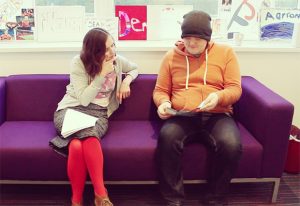Charity, Now Including Design

Between May 2014 and May 2015, I was fortunate to be Snook’s embedded designer within young people’s charity Includem. Their one-to-one support model helps young people in creating and sustaining positive changes so that they lead happy and healthy lives. The Transitional Support Service takes young people through the transition from Child Services to adult life. Includem asked Snook to help them develop the future of this service.
Between May 2014 and May 2015, I was fortunate to be Snook’s embedded designer within young people’s charity Includem. Their one-to-one support model helps young people in creating and sustaining positive changes so that they lead happy and healthy lives. The Transitional Support Service takes young people through the transition from Child Services to adult life. Includem asked Snook to help them develop the future of this service.
The first half of the project put forward recommendations; some of which were developed in this subsequent phase.
Since January, I have worked closely with 3 Transitional Support Service young people from both Glasgow and Fife, and their workers. Two of them chose to look at the wider recognition and understanding of Transitional Support, whilst the third focused on ways in which Includem could and should support young people to participate more widely and more often in Includem’s service development and delivery.
Together, we have developed a series of tools and publications which workers can use with young people and other professionals in communicating Includem’s work. We also developed a framework which Includem will consider whenever an opportunity arises for young people to become involved in projects. I was inspired by the way young people engaged with the work. I will be taking many of the “Principles for Participation” which we developed with me in further work with Snook.

Of particular importance amongst these principles was this question; how does participation benefit the participant? I sometimes feel user participation projects sometimes forget this question. Repeated exposure to projects with no visible or tangible benefit to the individuals asked to take part can lead to participant-fatigue or over-consultation. With no real sense of ownership in a piece of work, individuals involved can find themselves giving “expected answers” or agreeing with and approving ideas and solutions already proposed by the organisation.

To address this within our own project (for Snook and Includem were, of course, asking three young people to donate their time, experiences and expertise as participants) we undertook a number of measures. As well as prototyping how young people might be involved specifically in Includem recruitment going forward, I made it a priority to continually consider what direct benefit the young people I worked with might experience at each stage of our own project. At the end of the project – after co-presenting the work to Includem’s staff – I sat down with young people and we talked about the work they had taken part in. I asked for honest feedback on the process, so that both Snook and Includem might learn from this in future work, and to give me feedback on what skills over the course of the project.
I prepared a book for each participant which reviewed our process, tools and methods as well as the skills they had used along the way. Included in this I gave some examples of how these skills and processes might be used again in the future. We spent some time reviewing all we had achieved and how we had come so far. One young person requested that I prepare “challenge postcards” for all staff, to be distributed at our final presentations. Staff were asked to make a promise or commitment to carry on the work in some way or adopt elements of it into their own practise. These signed postcards are now displayed publicly in Includem’s offices. Includem have committed not only to take forward and develop our recommendations and prototypes, but to keep the young people who worked on them involved and abreast of any developments. If projects are unable to move forward, or halted, they will be informed of the reasons for this. Only with this accountability can we say that participation has been meaningful. Finally, I was delighted to write references for those involved throughout and I wish them the best of luck in all future endeavours.

A special mention must go to the workers who not only supported these three young people throughout the project, but also made the most incredible contributions of their own. And I must thank all those workers and staff throughout Includem who made me feel a part of their organisation and all the friends I made amongst them.
A single blog post isn’t really enough to do justice to the hard work and commitment demonstrated by the young people and staff engaged at Includem over the past year. I am truly in admiration of this organisation and the young people they support; not only do they do incredible, often difficult, impactful and important work – they also demonstrated that they are not afraid to shake up their practice and adopt new, innovative, initially scary methods and projects. A truly progressive, brave and impactful organisation of staff and young people alike – many others could learn a thing or two from them – I certainly did.